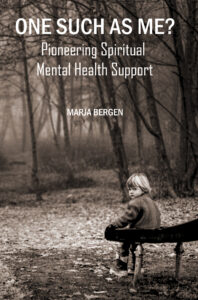ONE SUCH AS ME? finally brought to light.
In 2011, an organization was fo unded in Vancouver that promised to equip churches and parishes to support mental health recovery within their community. They did this by providing online courses that explained the ins and outs of mental health. Churches were delighted to have information that improved their understanding. They learned a lot. It was a good thing. The ministry drew a large following.
unded in Vancouver that promised to equip churches and parishes to support mental health recovery within their community. They did this by providing online courses that explained the ins and outs of mental health. Churches were delighted to have information that improved their understanding. They learned a lot. It was a good thing. The ministry drew a large following.
But there was something important missing. Although it served the Church, the importance of faith and the role Jesus could have in the healing of Christians under their care, was not part of the conversation.
A few years earlier, in 2006, another ministry, Living Room, was founded which provided peer support groups for people with mood disorders. Here they received the kind of support their churches had not been able to give them. Members were able to share with others who, like themselves, were struggling with symptoms of illness and—even more than that—the pain of stigma.
Most importantly, their spiritual needs were met as they studied scripture and learned about God’s unconditional love for them. The gospels showed them how Jesus sought out individuals like themselves who had been rejected by the world they lived in. They learned how Jesus could be there for them as well. Much healing occurred at those meetings.
News about Living Room and what it offered spread and within a couple of years it had become a movement. Many other groups sprang up across Canada. But there were not enough resources to keep the ministry going. In 2014, the organization I mentioned at the beginning of this post had become well organized and came to the rescue, offering to merge with Living Room. The work was entrusted into their care.
But they did not have the spiritual passion that Living Room needed. In 2018 they removed the ministry from their mandate. I tried to change their minds, but they would not budge. Although there are still three small Living Room groups in existence, the further development of groups was abandoned. In effect, spiritual support for people with lived experience no longer had support.
The story of the 14 years of work done during the years 2000 to 2014 was lost. It was not until I went through my journals, blogposts and emails a few months ago and pulled together the chronicled account of my work that the story came to light. For the first time since around 2015.
And so, we now have my book, ONE SUCH AS ME? that will show how people at one time eagerly listened to a person with lived experience. It shows how well she was heard. The book clearly documents the impact made to people’s understanding about mental illness. Those who heard welcomed the point of view of someone living with it. Unfortunately, today very few are willing to listen to such a point of view.
My book, ONE SUCH AS ME: Pioneering Spiritual Mental Health Support, shows a world that is different from what it is today—the world before 2014. It’s a story—lost for far too long—of how God made an impact on the world’s understanding about mental illness through the life of a person with a severe mental illness. The book chronicles all that made this possible, complete with factually supported happenings, personal meditations and prayers. It builds understanding from the point of view of someone who knows what it is to live with mental illness, yet was determined to answer God’s call on her life to serve those who struggle as she does. It’s a beautiful story about God and what he was able to do in the life of a person for whom the world holds out so little hope – a person who believes that all things are possible with God.
I ask those with mental illness, as well as those with good mental health: “If God can do this for one such as me, what can he do for you?”
marja
Leave a Reply